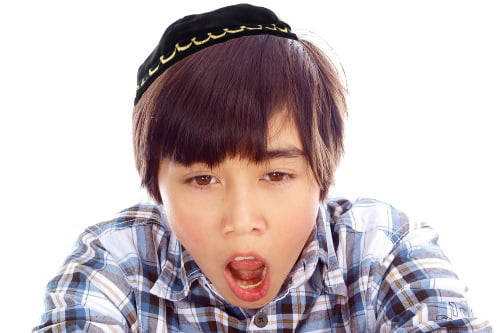|
Getting your Trinity Audio player ready...
|
By: Nechama Golding
So you’ve been invited to share a Seder—the ritual-rich evening that is the highlight of Passover, the Festival of Freedom—with an observant family.
You might be familiar with some of the highlights of the Seder: the Four Questions that the children sing; the Seder plate, laden with ceremonial foods; the four cups of wine; the matzah and bitter herbs; all in some way related to the story of how a small group of slaves escaped Egypt’s borders to become the Nation of Israel… Or it might all be totally new to you.
In either case, don’t worry. Firstly, your hosts will guide you and tell you anything you need to know. Secondly, at the Seder you will receive a small book, called the Haggadah, that contains the instructions and text for all 15 steps of the Seder, and you will have plenty of time to peruse it as the night progresses.
If you are curious or you’d like to be better informed before you come, you will find our Passover section helpful, but you certainly do not need to study up before attending.
That said, here are a few insider tips that will allow you to better allow you to enjoy the night ahead:
Tip #1: Expect a late night
The Seder will not start until everyone has returned home from the evening prayer service, which itself will not have started until after sunset. By the time the Seder itself commences it might be in the neighborhood of 9 p.m. or later, depending on what time sunset was that day. The Seder can continue till well after midnight in some families.

Tip #2: Don’t come too hungry…
Aside from a few cups of wine or grape juice (and a piece of onion or potato dipped in salt water), no food will be served till pretty late in the game. The word seder means “order,” and central to this evening is a very exact schedule of steps. The step of reading and discussing the story of the Exodus, which takes up the bulk of the Haggadah, comes before the steps of eating matzah and bitter herbs (maror), and it is only after eating these ritual foods that participants enjoy a free-style feast. Your hosts WILL feed you… just not right away!

Tip #3: Be ready for a text-based evening
The Seder is a very text-centric night, as participants keep a Haggadah close at hand throughout. Many books are printed with an English translation, but there is still likely to be a lot of Hebrew buzzing around you. Some families will get more gung-ho with discussing the text free-style, while others may at times choose to recite parts of the text with little discussion. Some families will enter into the singing of songs with gusto, while in others the singing may be a sideline… In any case, relax. No one is expecting you to suddenly know another language. (A little secret… those little kids reading the Hebrew words so fast? They might not know what all the words mean either.)

The core of the Seder text is the asking of questions and the answering of answers. Try to follow as best you can, but if it is difficult, feel free to read along at your own pace and consider the meaning of what you are reading. Any questions you have, feel free to ask. That is truly what the Seder is about.
And don’t worry. Anything you really need to know—like if it’s time to get up and head to the kitchen to wash your hands yet again, but this time with a blessing, or to drink another cup of wine—your hosts will tell you.
Tip #4: …but be ready to eat
When it is time to eat matzah or maror, you might see everyone digging into what seems like hefty servings of these foods. That is because Jewish law provides pretty exact guidelines for how much matzah and maror should be eaten on this night, and it’s more than a nibble.
You might also find that everyone falls uncharacteristically silent while this ritual eating is going on. That’s not because they’re rude. It’s because they just said blessings thanking G‑d for the mitzvah of eating these specific foods, and they want as little separation as possible between the blessing and the eating. Your hosts will probably try to tell you everything you need to know before launching into these steps, but it’s fair to expect a certain amount of hand motion communication during this part of the Seder. You can engage in it yourself as well.

Tip #5: Dress code?
Be slightly dressed up but also ready for a long evening… Men will feel most comfortable in a suit or blazer and kippah, and women in a modest dress or modest top and skirt. If your dress or top has short sleeves or is sleeveless, a cardigan is a good idea.
Tip #6: Bring a Gift?
It is not expected for you to bring a gift. That said, if you really want to give your hosts something, discuss it with them in advance—both what you’d like to bring and when you would like to bring it (possibly before the holiday starts).
Whatever you do, don’t bring a surprise gift of food on Passover. Different families observe the rules of avoiding even traces of leaven on Pesach with varying degrees of stringency, and it is probably safest to avoid giving food altogether. Many Orthodox families who are otherwise close friends will not give food to each other during this week, just to avoid potentially awkward situations.
Tip #7: Special rules
You might already be aware that many (though not all) of the same rules that govern the behavior of observant Jews on Shabbat are in effect during the first two days of Passover, when the Seders are conducted, as well. Most notably, just like on Shabbat, observant Jews won’t operate electric switches during these days.
Some practical tips associated with the special rules of Yom Tov:
Make sure you have good directions to the house beforehand, as your hosts will not be answering their phones once Passover begins.
When you come, don’t ring the doorbell. Knock instead.
Don’t take pictures, or use your phone.
Don’t turn off any lights, as there will be no holiday-permissible way to turn them back on.
When using the bathroom, avail yourself of the tissues or pre-torn toilet paper rather than tearing toilet paper. Don’t worry, there is no problem at all with flushing the toilet.
Tip #8: Enjoy
At the end of the day, people are people and families are families. Passover has an exceptional focus on children. The Four Questions are questions that children are taught to ask their parents, and the rest of the Haggadah is the explanation that the parents give. If any holiday is all about interacting with children, enjoying their curious minds and cute little voices, it is this one. So whether you speak Hebrew or don’t, whether you learned the Four Questions yourself as a child or didn’t, it doesn’t really matter… This is the time to gather together and enjoy being what we are—a family. The family of Jews, descended from the original Egypt escapees. Enjoy!





